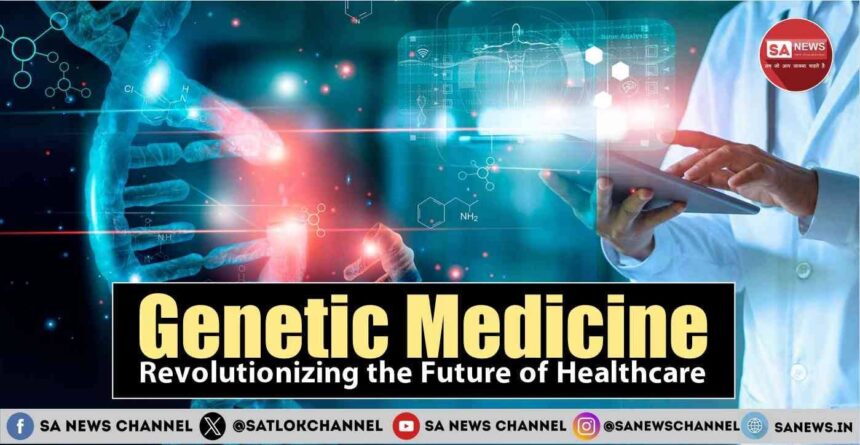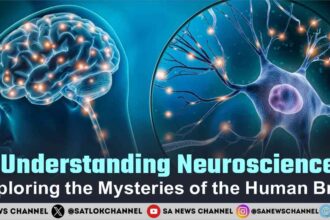Imagine a world where diseases like cancer, diabetes, or heart conditions are not only treatable but preventable—thanks to the power of our DNA. This is the promise of genetic medicine. As our understanding of the human genome advances, we are entering a new era of healthcare that is precise, personalized, and predictive. Genetic medicine involves the use of genetic information to diagnose, treat, and prevent diseases. From gene therapy to pharmacogenomics and CRISPR, this field is rapidly transforming how we approach medical care.
- What is Genetic Medicine?
- Historical Perspective
- Applications of Genetic Medicine
- Technologies Powering Genetic Medicine
- Ethical and Social Considerations
- Challenges in Genetic Medicine
- The Role of Genetic Counseling
- Global Impact and Equity
- The Future of Genetic Medicine
- Conclusion
- Spiritual Insight: What Sant Rampal Ji Maharaj Explains Beyond DNA and Disease
- FAQ’S related to Genetics Medicine
- Q1. What is genetic medicine?
- Q2. How does genetic testing help?
- Q3. What is gene therapy?
- Q4. What is pharmacogenomics?
- Q5. How does it help in cancer treatment?
- Connect With Us on the Following Social Media Platforms
In this blog, we will explore the foundations, breakthroughs, applications, challenges, and future of genetic medicine in detail.
What is Genetic Medicine?
Genetic medicine refers to the use of genetic and genomic information in clinical settings. It encompasses a wide range of applications:
- Genetic Testing: Identifying gene mutations linked to diseases.
- Gene Therapy: Altering genes to treat or prevent illness.
- Pharmacogenomics: Tailoring medications based on a person’s genetic profile.
- Genetic Counseling: Helping patients understand and adapt to the medical implications of genetic conditions.
This field merges genetics, molecular biology, and clinical science to offer more effective and personalized treatment options.
Genetic medicine enables healthcare professionals to move from a “one-size-fits-all” approach to one that is tailored to the individual, improving treatment outcomes and reducing side effects.
Historical Perspective
The origins of genetic medicine trace back to the discovery of DNA by James Watson and Francis Crick in 1953. Yet, it was only after the Human Genome Project (1990–2003) mapped all human genes that contemporary genetic medicine really started.
- 1953: DNA’s double-helix structure discovered.
- 1970s: Genetic engineering and recombinant DNA technologies developed.
- 1990: Human Genome Project launched.
- 2003: Completion of the human genome sequence.
- 2012–Present: Rise of CRISPR and gene-editing technologies.
These milestones laid the foundation for today’s breakthroughs in genetic medicine, opening new frontiers in understanding human biology and disease.
Applications of Genetic Medicine
a. Genetic Testing and Diagnosis
Genetic testing identifies mutations in DNA that may cause diseases. It’s commonly used for:
- Detecting inherited disorders (e.g., cystic fibrosis, sickle cell anemia).
- Estimating the risk of cancer (for example, BRCA1/BRCA2 related to breast and ovarian cancer).
- Diagnosing rare genetic conditions in children.
- Prenatal screening to detect genetic anomalies in unborn babies.
Testing can be conducted using blood, saliva, or tissue samples, and results can guide medical decisions and lifestyle changes.
b. Gene Therapy
Gene therapy involves inserting, removing, or modifying genetic material within a patient’s cells to treat disease. There are two main types:
- Somatic Gene Therapy: Targets non-reproductive cells and affects only the treated individual.
- Germline Gene Therapy: Alters genes in sperm or eggs, affecting future generations (currently controversial and largely restricted).
Recent FDA-approved gene therapies treat diseases like spinal muscular atrophy, inherited retinal diseases, and some forms of leukemia and lymphoma.
c. Pharmacogenomics
Pharmacogenomics examines how genes influence a person’s reaction to medications. It assists doctors:
- Choose the most effective medication.
- Determine optimal drug dosage.
- Avoid adverse drug reactions.
This approach is especially useful in treating cancers, cardiovascular diseases, epilepsy, and psychiatric conditions such as depression or schizophrenia.
d. Cancer Genomics
Understanding the genetic mutations behind different cancers helps doctors create targeted treatments. For example:
- HER2-positive breast cancer: Treated with trastuzumab.
- EGFR mutations in lung cancer: Managed with tyrosine kinase inhibitors.
- BRCA mutations: Influence treatment decisions and risk-reduction strategies.
Tumor profiling through genomic sequencing is becoming a routine part of cancer care.
Technologies Powering Genetic Medicine
a. Next-Generation Sequencing (NGS)
NGS allows rapid sequencing of large sections of DNA or entire genomes, making genetic testing faster, more detailed, and more affordable. It has revolutionized diagnostics, especially in rare disease identification and cancer treatment planning.
b. CRISPR-Cas9
CRISPR is a revolutionary gene-editing tool that allows scientists to precisely alter DNA. It holds promise for curing genetic diseases such as sickle cell anemia and muscular dystrophy. Research is also exploring its use in modifying immune cells to fight cancer.
Also Read: 3D-Printed Bionic Organs Transform Medicine
However, CRISPR raises ethical concerns, particularly when used on embryos or germline cells.
c. Bioinformatics and AI
Advanced computational tools analyze vast genomic data to identify disease-causing genes and predict treatment responses. Artificial intelligence (AI) is helping accelerate drug discovery, match patients to clinical trials, and personalize therapies.
Ethical and Social Considerations
With great power comes great responsibility. Genetic medicine raises several ethical and societal questions:
- Privacy: Who owns and controls your genetic data?
- Consent: How is informed consent ensured, especially for children and vulnerable populations?
- Discrimination: Could employers or insurers misuse genetic information?
- Designer Babies: Should gene editing be allowed to enhance traits like intelligence or appearance?
Laws similar to the Genetic Information Nondiscrimination Act (GINA) in the U.S. and various European regulations attempt to protect individuals, but continuous oversight is needed.
Challenges in Genetic Medicine
Despite its promise, genetic medicine faces numerous challenges:
- High Costs: Genetic testing and therapies can be expensive, limiting access.
- Limited Awareness: Many people, including healthcare providers, lack education about genetic medicine.
- Data Complexity: Understanding genetic information needs specific expertise and tools.
- Unequal Access: Disparities exist between countries and within populations.
- Regulatory Barriers: New therapies must go through lengthy approval processes.
Ongoing efforts aim to make genetic medicine more affordable, understandable, and widely available.
The Role of Genetic Counseling
Genetic counseling plays a crucial role in genetic medicine. Trained professionals help individuals:
- Understand the results of genetic tests.
- Assess risks and implications for family members.
- Make informed medical and lifestyle choices.
Counselors provide emotional support and bridge the gap between complex scientific data and patient understanding.
Global Impact and Equity
Genetic medicine has the potential to improve global health outcomes, especially for rare and chronic diseases. However, global collaboration is essential:
- Equity in Research: Most genetic studies have focused on people of European descent. Inclusive data from diverse populations is needed.
- Affordable Access: Developing countries require infrastructure and funding to adopt genetic medicine.
- Education and Training: Building a skilled workforce is critical to implementing genomic healthcare.
International initiatives like the Global Alliance for Genomics and Health (GA4GH) promote responsible data sharing and collaboration.
The Future of Genetic Medicine
Genetic medicine is poised for transformative growth. Key trends include:
- Personalized Healthcare: Entire treatment plans based on an individual’s genetic makeup.
- Preventive Medicine: Identifying risk before symptoms appear.
- Gene Editing for Common Diseases: Potentially curing conditions like heart disease or Alzheimer’s.
- Integration with Digital Health: Mobile apps, wearables, and electronic health records will integrate with genetic data.
- Global Genetic Databases: Collaborative efforts to collect diverse genetic data to improve research and care.
Startups and biotech companies are investing heavily in AI-powered diagnostics, at-home DNA testing kits, and personalized genomic apps.
Conclusion
Genetic medicine stands at the intersection of science, technology, and humanity. By unlocking the secrets of our DNA, we are not just treating illness—we’re rewriting the future of medicine. The possibilities are enormous, but we must tread carefully, ensuring that innovation is guided by ethics, equity, and empathy.
From diagnosing rare diseases to customizing cancer treatment, from preventing hereditary conditions to exploring the boundaries of gene editing, genetic medicine is not just a scientific marvel—it’s a life-saving revolution.
As this field continues to evolve, one thing is clear: the blueprint of life now holds the blueprint of health. And in understanding our genes, we may finally learn how to outsmart disease and improve lives on a global scale.
Spiritual Insight: What Sant Rampal Ji Maharaj Explains Beyond DNA and Disease
While genetic medicine delves deep into the mysteries of DNA and the physical body, Sant Rampal Ji Maharaj provides profound spiritual knowledge that goes beyond the genes. According to His spiritual teachings from the holy scriptures like the Sukshm Ved and the Gyan Ganga, a person’s suffering—whether physical or mental—is often rooted in karmic consequences from past births.
Modern science focuses on the genome to find causes and cures, but Sant Rampal Ji reveals that liberation from disease and sorrow comes not just from external treatment but from the right spiritual path.
He teaches that diseases may be results of previous karmas, and to truly overcome them, one must attain Naam Diksha (initiation) from an enlightened Saint and follow true devotion (Satbhakti). His disciples often report improvements in chronic or genetic health issues after adopting the spiritual practices prescribed by Him, which include daily scripture-based worship, abstaining from harmful habits, and living a moral life.
Thus, while genetic medicine offers solutions for the body, Sant Rampal Ji Maharaj offers the key to healing both the body and soul, ultimately freeing one from the cycle of birth, death, and disease.
FAQ’S related to Genetics Medicine
Q1. What is genetic medicine?
It’s a field that uses DNA information to diagnose, treat, and prevent diseases in individuals.
Q2. How does genetic testing help?
It identifies mutations in genes, helping doctors detect inherited disorders and make better treatment decisions early.
Q3. What is gene therapy?
Gene therapy involves altering genes within a patient’s cells to treat or prevent genetic disorders and diseases.
Q4. What is pharmacogenomics?
Pharmacogenomics customizes drug prescriptions based on a person’s genetics to ensure maximum effectiveness and fewer side effects.
Q5. How does it help in cancer treatment?
Genetic profiling of tumors helps doctors select targeted therapies based on specific mutations in cancer cells.









